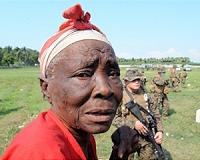| . |  |
. |
Port-Au-Prince (AFP) Jan 25, 2010 Haitian police on Monday shot indiscriminately at scavengers and looters in Port-au-Prince, hitting two in the head as post-quake security deteriorated, an AFP photographer reported. A group of police, pushed to keep control among a desperate population after the January 12 tremor which killed or injured many of their number and destroyed the city prison, opened fire on a warehouse from a building opposite. An AFP photographer inside the scavengers' building said two men were hit in the head, one of whom received medical attention. Two others were lying prone on the floor, one lifeless. The other was treated for a serious head wound. A Haitian man in the street outside said he saw police pistol whip a man. "This guy was trying to go inside (the warehouse), the cops took a gun straight to the back of the head. I don't know why they do that. It's not fair because everyone in Haiti is hungry," the man, who declined to give his name, said. Looters and scavengers have moved into the downtown commercial district, taking what they can from the ruins as bulldozers demolished damaged shops and warehouses. The Haitian government has said the death toll from the January 12 quake, which shattered what little infrastructure existed in the capital and left a million people homeless, is expected to be around 150,000.
EU to send police to Haiti, despite British objections European Union foreign ministers meeting in Brussels agreed on a total contribution of "at least 300 officers" to help the UN's stabilisation mission in Haiti, EU foreign policy supremo Catherine Ashton told reporters. France's European Affairs Minister Pierre Lellouche, whose country is one of the biggest contributors with 140 officers, said the MINUSTAH mission could reach 350 people on the ground. Italy will offer around 100 officers, following a United Nations call to boost the figures. On Sunday, the mission head Edmond Mulet said there was an enormous need for personnel, fuel and vehicles. Spain, which holds the EU's rotating presidency, and The Netherlands will also contribute, possibly alongside Portuguese and Romanian police, meaning Europe will at least double the UN's request for 150 officers. "Together we will represent the EU in this role of guaranteeing the security and above all the arrival of the emergency aid which the Haitians' need," said Spanish Foreign Minister Miguel Angel Moratinos. Britain has been cool on the plan, insisting that the United States -- with some 20,000 troops in the area -- had more than enough personnel to provide for security needs. "I'm not sure that that is necessarily the right way to go," Britain's minister for Europe Chris Bryant told reporters as he arrived for the talks. British Foreign Secretary David Miliband underlined: "The security presence that has been established has been vital and I think actually the United States has done well on that." The EU is the biggest humanitarian aid donor in the world and has already earmarked more than 420 million euros (600 million dollars) in emergency and reconstruction aid for Haiti -- where at least 150,000 people were thought killed in the January 12 quake. However the EU's efforts have little visibility on the ground. The United States, some 300 kilometres (210 miles) from Haiti and with troops in the region, has been able to mobilise vast quantities of aid and resources, and has led supply and search and rescue work in tandem with the UN. The EU's police mission is dwarfed by comparison but Miliband insisted: "We back up the American and UN efforts because this is a UN enterprise." Germany will not take part due to restrictions under its constitution. The EU has been struggling to find 200 gendarmes to fill out its police mission in Afghanistan, where experts needed to build a national security force capable of protecting its own people are in desperately short supply. The EU foreign ministers also agreed to create a "coordination cell" in Brussels, to avoid doubling up individual efforts by member states. The moves come after Ashton was accused of not taking a high-profile role in the aid efforts, failing for instance to visit Haiti since the devastating quake. "What was certainly missing was (EU) visibility right away, a flag right away," said Lellouche, adding that the creation of a European emergency aid force would help. That idea has been rolling around EU corridors for several years without any result. Ashton defended herself by saying she had only been in her job for six weeks. She promised: "We will look at the lessons learned and come forward with proposals," in order to get aid out quicker in the case of future catastrophes.
Related Links Bringing Order To A World Of Disasters A world of storm and tempest When the Earth Quakes
 Refugees from 'nightmare' swamp Haitian town
Refugees from 'nightmare' swamp Haitian townSaint Marc, Haiti (AFP) Jan 25, 2010 The Haitian town of Saint Marc is sinking beneath a tide of humanity, with 10,000 refugees lodging with friends, strangers or in churches after fleeing the nightmare of the quake-hit capital. Buses incessantly pass through the town some 80 kilometers (50 miles) north of Port-au-Prince, loaded with earthquake victims hoping to find food and shelter from the aftershocks of the January 12 disas ... read more |
|
| The content herein, unless otherwise known to be public domain, are Copyright 1995-2009 - SpaceDaily. AFP and UPI Wire Stories are copyright Agence France-Presse and United Press International. ESA Portal Reports are copyright European Space Agency. All NASA sourced material is public domain. Additional copyrights may apply in whole or part to other bona fide parties. Advertising does not imply endorsement,agreement or approval of any opinions, statements or information provided by SpaceDaily on any Web page published or hosted by SpaceDaily. Privacy Statement |